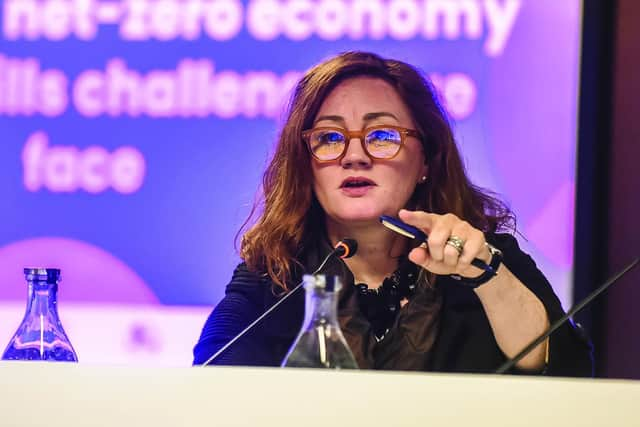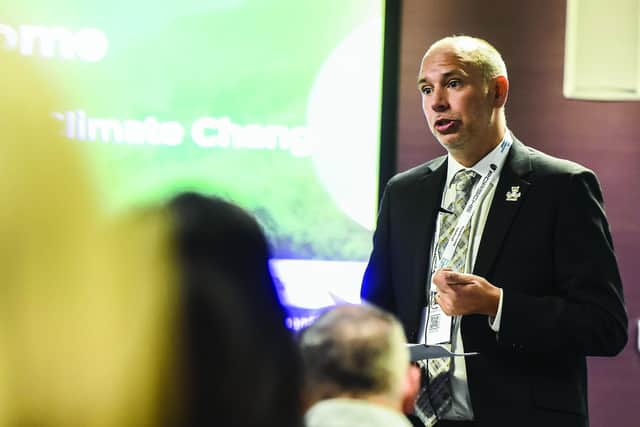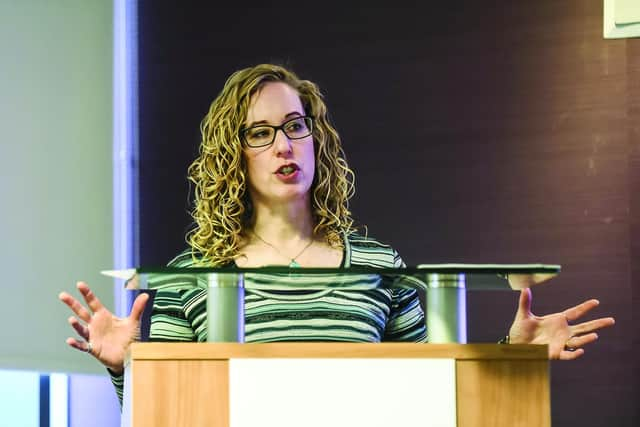Green Skills Conference: People in place to transform our future
Dave Reay, director of the Edinburgh Climate Change Institute, told the event in Edinburgh that Scotland could rise to the challenge of transforming its workforce to hit net-zero targets by 2045.
He said: “We can do this; we have the human capital in Scotland to deliver it. There are questions about funding, and the pathway is not always as clear as it should be. But let’s bottle what we have, join the dots, and understand the expertise we have here.
Advertisement
Hide AdAdvertisement
Hide Ad“Human capital and the workforce transition will be an issue at COP27 in Egypt, and people will be looking at what we are doing in Scotland – the responsibility comes back to us.”


Earlier, conference host Reay warned that climate change faced an “attention crisis”, saying: “There’s a real danger at the moment of missing opportunities to tackle climate change because of these other, hopefully short-term, but very acute issues – war in Ukraine, the cost of living crisis, energy and food crises. That is leading to a climate change attention crisis.
“But if you think about all of these challenges, climate change is the underpinning risk factor in terms of making them worse.”
Reay continued: “If we think about those [climate change] pledges we’ve got in Scotland, the UK and globally, they aren’t just numbers on a bit of paper or spreadsheet. What matters is people. What matters is how the targets are implemented, the skill sets, and how people work locally.
“It’s the workforce that is going to deliver a resilient and fair transition to net-zero. It’s never been so important to get this right – the responsibilities are massive, but the potential is huge.”


Lorna Slater MSP, Scottish Government minister for green skills, circular economy and biodiversity, laid out the skills challenge - highlighting three key areas of focus – transportation, heat in buildings (“upgrading Scotland’s homes, making sure every building in Scotland is efficient, saves energy and uses low-carbon heating”) and renewable energy, with an increasing emphasis on areas such as energy storage and green hydrogen.
This would help “not only reach net-zero, but also reach our economic aspirations where we have significant opportunities either unique to Scotland, or that we’re uniquely positioned to take advantage of”, she said.
Heating buildings more efficiently was “a win for everyone”. Slater said: “It improves people’s well-being and their health, it reduces costs, reduces emissions, and will create tens of thousands of jobs. It is so key to what we need to do.”
Advertisement
Hide AdAdvertisement
Hide AdHowever, she added, there were real skills challenges: “Everywhere I go, I hear people saying we don’t have enough people who know how to install heat pumps, or design heating systems, or install charging points for electric vehicles. One of the challenges I’m bringing to you is what tools do we have at our disposal collectively to bring skilled workers into these areas – transport, heating buildings and energy?”


Slater said there was a big focus on areas like green construction, but highlighted other areas with big employment, including land-based skills like forestry, regenerative farming and peatland restoration.
She gave a practical example of where she had encountered skills shortages: “One visit – with Edinburgh Council to see trees suffering from ash dieback (plant health sits within my portfolio) – sticks in my mind. I was walking through trees suffering from ash dieback and said to a council representative, ‘What’s the challenge, what do you need to tackle this?’ And he said, ‘I need the people. I’ve got three open posts, but there aren’t enough people with expertise in this particular science.’
“He wasn’t asking for more money, he didn’t want to change legislation. He just needed skilled people. I thought that was a really interesting illustration of some of the challenges we’ve got ahead of us, but also of the opportunities.
“Across my portfolio in every area, we have skills gaps identified and these are not just low-paying jobs…[but] well-paid jobs for people with scientific and practical backgrounds.”


Slater also called for greater efforts on the circular economy, to unlock its value. “I’m trying to get rid of the word ‘waste’,” she told delegates. “In the circular economy, we cannot tolerate wasted energy, wasted materials – those are resources. A tonne of scrap steel is valuable, a tonne of scrap plastics is valuable, if you clean it and get to the right people who can re-manufacture it. There are huge [circular economy] opportunities for entire new sectors that don’t even exist now.”
Her final appeal was for emerging professions to do better on diversity, as she highlighted her own experience as an engineer in the renewables sector: “We’re still at about 9 per cent of women in engineering. During my career, I was traditionally the only woman in a workplace, which is a real shame. There’s a particular narrative about STEM [science, technology, engineering, and mathematics] subjects and about women in STEM that we absolutely have to get rid of – that careers like engineering are not creative. But what is more creative than solving problems that no-one’s ever had before?
“And I always found engineering hugely collaborative. I’ve never felt more like part of a team when we’ve got a bunch of engineers with different skill sets with different experiences coming together to solve a problem. These are collaborative, creative meaningful careers – the skill sets we need to reach net-zero, create economic opportunities, and save the world.”
Advertisement
Hide AdAdvertisement
Hide AdGender equality in the workplace was not a “nice-to-have”, Slater said. “ This is something we actually have to do. How do we change this. Let’s put our heads down and figure out how.”
Linda Christie, head of green skills at Skills Development Scotland, told the conference that net-zero had become central to skills provision: “It was previously an add-on to what we do, now it’s a core part.
“We’re working together through the Climate Emergency Skills Action Plan to support people in industry to ensure they are equipped with the skills and ready to make that change.”
She added: “Much like an industrial revolution, what we’re experiencing is a green revolution. It’s an economic and social restructuring – and we want to do that with as little disruption as we can and take people and businesses with us.”